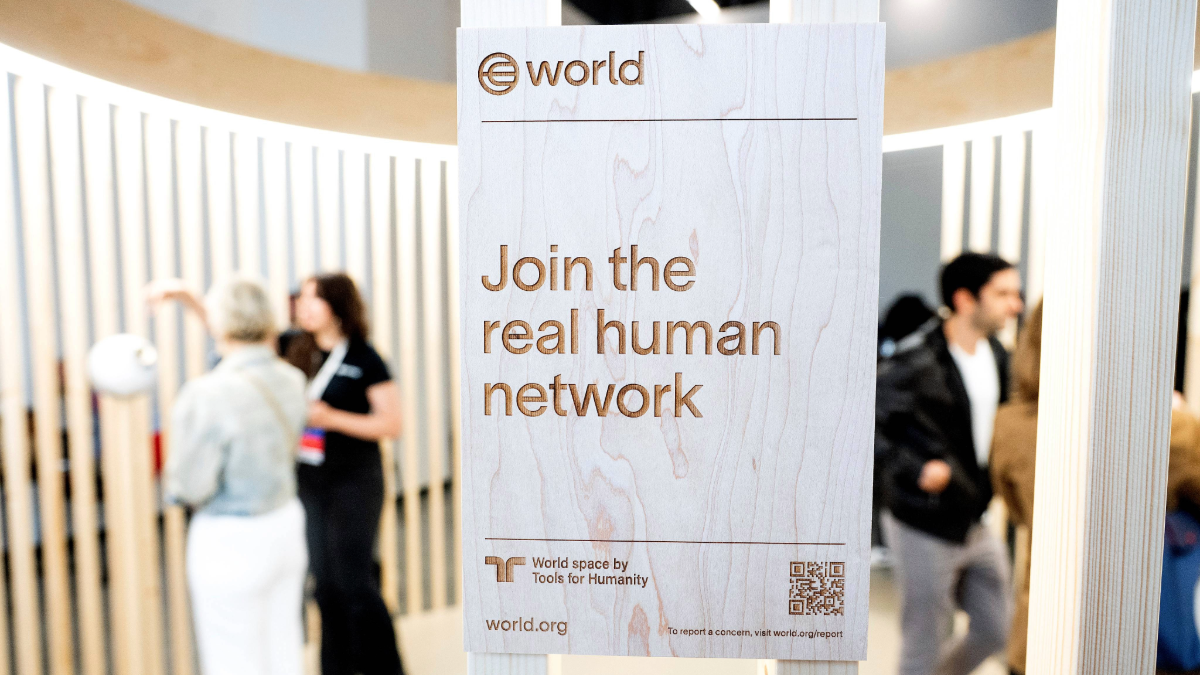Sam Altman’s World: Sometimes Things Are Just What They Seem to Be
David McNeill, Emily Tucker / May 15, 2025
People verify their World IDs on Thursday, May 1, 2025, in San Francisco, Calif. (AP Photo/Noah Berger)
This month, no doubt encouraged by the Trump Administration’s recent refashioning of the crypto market into a funnel for the president’s self-enrichment, Sam Altman and his colleagues at Tools for Humanity officially launched “World” in the US. World (formerly “Worldcoin”) is many things. It is a blockchain-based biometric identity verification system. It is a cryptocurrency project. It is a super app promising ID integration with financial services, dating, gaming, and betting platforms. It also claims to be a humanitarian project with the goal of global wealth redistribution, eventually (maybe!) providing a universal basic income to all the 'real' human beings the imagined revolution in artificial general intelligence (AGI) will dispossess. All you have to do to gain entry into this exciting new World is look into the Orb and let it scan your irises, providing a unique “proof of human.”
If this scheme sounds dystopian and legally questionable to you, you are in good company. World’s US launch is preceded by an ignominious history of investigations, suspensions, and outright bans by various countries (including Brazil, Colombia, Germany, France, Hong Kong, Indonesia, Kenya, Portugal, South Korea, and Spain) due to violations of privacy and data protection laws. So far, World’s global rollout has heavily targeted developing nations in the Global South, exploiting the fact that, as a 2022 MIT Technology Review story put it, “it’s just cheaper and easier to run this kind of data collection operation in places where people have little money and few legal protections.”
Luckily for Altman, the undisguised fact that World’s business model involves sending corporate emissaries into Southeast Asian villages to engage in biometric marauding has not cooled his reception in the US. Almost as flagrant as the company’s apparent lawlessness and dishonesty has been the failure of political actors and members of the media to identify that lawlessness and dishonesty for what it is. Altman continues to keynote national conferences on privacy, to be invited to share stories of his childhood at Senate hearings, and to be fawned over by prominent media outlets.
Kevin Roose of The New York Times, in a limpid column written from the World US launch event in San Francisco, transcribed Altman’s pitch for World as a solution to the problem of “trust in the age of AGI.” Since Altman’s company defines “AGI” by projected profitability, what “trust” really means is the ability of various platforms to discriminate between unique human beings and chatbots. Roose smooths over the much more significant trust issue—the trust any user must place in Sam Altman and Tools for Humanity before providing them with a putatively unique biological marker of their humanity. Roose’s article is an awkward semi-comic invitation to overcome any queasiness we might feel at the prospect of a tech billionaire scanning all human eyeballs. It dismisses as “hiccups” the long list of legal violations and examples of corporate misconduct that have resulted in World being banned or investigated in countries across the globe. Roose encourages us not to worry about privacy concerns, since Tools for Humanity has such impressive “baked-in privacy features,” without mentioning the fine print disclosures—that all products, policies and services can be changed without prior notice at the company’s sole discretion, or the fact that if World were to be acquired, merged or restructured, World retains the right to transfer to that new entity any data it has collected (subject “to applicable law”).
There is a growing cadre of journalists, politicians, billionaires, and wannabe billionaires who seem to think they can meme away, via references to Black Mirror and chuckling misuses of the term “Orwellian,” the techno-hegemony explicitly motivating the World project. We must see this co-opted chorus for what it is, because their goal is to soothe or bully or embarrass us out of our common sense understanding, and natural terror, of what World and projects like it clearly are. Sometimes something that looks dystopian is, in fact, dystopian.
But what precise flavor of dystopia does World promise? There are at least three possibilities, each of which filters early 20th-century monopolism or age-old despotism through mid-20th-century science fiction narratives, and which grow successively darker the more seriously one takes the claims that Altman has explicitly made.
There are, of course, very good reasons not to take Altman at his word. The fact that OpenAI is not and has never been ‘open’ is only the most obvious tip-off. Promises of a universal basic income (like Altman’s current patriotic posturing) may be every bit as disingenuous as his early promise to “allow wide swaths of the world” to elect representatives to OpenAI’s governance board. If that is the case, perhaps all that we have to fear from Altman is the same thing we should fear from Mark Zuckerberg. Or, to use Altman’s preferred language, a “super-exponential” Zuckerberg. The least terrifying aspiration implicit in both World’s name and its motto (“Identity, finance and community for every human”) is a comprehensive, extra-legal, extra-regulatory finance and data ecosystem governed at Altman’s discretion. The folks at Tools for Humanity suggest that in the near term, they plan to generate revenue by charging fees to apps and services that use World ID to verify users, and through transaction fees on financial services. But it is not hard to imagine things following the path laid out by ChatGPT, with users eventually having to pay a monthly subscription if they want the system to recognize their humanity.
A second, far more troubling prospect is that Altman actually intends World to be a vehicle for global redistribution of the unlimited AGI “abundance” he relentlessly predicts is just around the corner. If you look at Altman’s recent posts, you will find vague references to “major decisions and limitations related to AGI safety that will be unpopular,” the time needed for “society and the technology…to co-evolve,” and his belief that “trending more towards individual empowerment is important.” One has to go all the way back to 2016, however, to see any reference to the democratic process. Some significant redistribution of the almost unfathomable wealth accumulated by the world’s wealthiest in recent years will be necessary if democratic politics worldwide is to have any hope of survival. But it should be more than obvious that entrusting that redistributive project to someone whose primary defining characteristic is unlimited ambition would be exceedingly unwise. This model of supposed beneficence is among the oldest paths to tyrannical authority. The only thing new is that the vehicle would be bitcoin and betting apps instead of bread and circuses.
To glimpse the darkest possible World future, it can be helpful to remember that Altman, for all his philanthropic self-presentation, has claimed to have little interest in “most people.” He claims not to care at all what other people think of him. He has stressed how important it is for “founders” to “distort reality for others” but not for themselves. We should also remember that Altman’s worldview seems to have been shaped by visions of the apocalypse. He owes his initial fame to his strategic leveraging of the threat of rogue super-intelligent AGI as a justification for ever greater levels of investment in “AI research,” though we know now that whatever concern he had for this supposed threat was dwarfed by his ambition. Finally, we must remember that the man who once gleefully described himself as a stochastic parrot, and who has evident disdain for merely human creativity, is more responsible than any other individual for popularizing the fantasy that in the very near term, algorithmic systems will be vastly more intelligent than any human being. What ultimate purpose should we imagine an individualized “proof of human” caste-mark would play in Altman’s post-singularity vision of the future?
There might be a tiny few with the “unstoppability” that marks, according to Altman, a great “founder.” These few could be a threat to Altman’s dominance. Whatever our gifts, experience, or expertise, the rest of us would be inefficiencies, mere drags on the staggering speed of the glorious algorithmic machine. The value of any “content” we could create would be vastly outstripped by what could be made of it by millions of “generative agents” with their high-quality feedback loops and endless iterations. If human intelligence really were to be as eclipsed as Altman assures us it will soon be, it would only be rational to ensure that (other) human beings were kept as far as possible from anything like participation in decisions about how World should be run.
While we have every reason to be afraid of the “World” Altman would like to build, what should scare us much more is that our crumbling institutions have done nothing, and seem likely to continue to do nothing, to stop him. Because while Sam Altman has been routinely and unironically labelled a “visionary,” the truth is that he is nothing special. He is best understood as a symptom rather than a cause. He is the kind of person who inevitably rises in an extractivist economic system that transparently rewards those who show contempt for laws, regulations, and the people who enact them. In such a system, the fear of being shut out of the increasingly narrow class of “winners” overwhelms any incentive to push back. If it weren’t Sam Altman trying to take over by selling our own humanity back to us, it would be someone else. And it will be someone else, and someone else again, until we put a stop to it.
Authors

